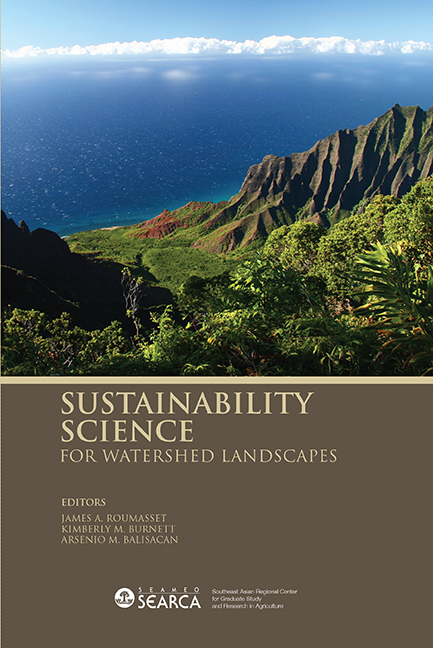Book contents
- Frontmatter
- Contents
- Tables
- Figures
- Message
- Foreword
- Preface
- Acknowledgments
- List of Contributors
- Theme 1 Sustainability Science for Resource Management and Policy
- 1 Economic Policy for Sustainable Development vs. Greedy Growth and Preservationism
- 2 Integrated Watershed Management: Trees, Aquifers, Reefs, and Mud
- 3 Transdisciplinary Research in Watershed Conservation: Experiences, Lessons, and Future Directions
- 4 Payments for Ecological Services: Experiences in Carbon and Water Payments in the Philippines
- Theme 2 Monitoring and Modelling
- Theme 3 Participatory Approaches
- Theme 4 Case Studies
- Synthesis
2 - Integrated Watershed Management: Trees, Aquifers, Reefs, and Mud
from Theme 1 - Sustainability Science for Resource Management and Policy
Published online by Cambridge University Press: 21 October 2015
- Frontmatter
- Contents
- Tables
- Figures
- Message
- Foreword
- Preface
- Acknowledgments
- List of Contributors
- Theme 1 Sustainability Science for Resource Management and Policy
- 1 Economic Policy for Sustainable Development vs. Greedy Growth and Preservationism
- 2 Integrated Watershed Management: Trees, Aquifers, Reefs, and Mud
- 3 Transdisciplinary Research in Watershed Conservation: Experiences, Lessons, and Future Directions
- 4 Payments for Ecological Services: Experiences in Carbon and Water Payments in the Philippines
- Theme 2 Monitoring and Modelling
- Theme 3 Participatory Approaches
- Theme 4 Case Studies
- Synthesis
Summary
ABSTRACT
We outline an approach for integrating sustainability science with policy science. We briefly review the types of policy analysis that need to be adapted to questions of environmental resource management and develop two of them in detail – optimisation and valuation for benefit-cost analysis.
Optimal resource management has to take into account the interactions with the surrounding ecosystem. Without well-established markets for these impacts, externality problems arise, leading to inefficient resource management. Traditional resource economics may not be capable of explaining the problem of resource management with interacting stocks, especially where the stock of an extractive resource impacts the stock of a second resource.
In our first application, groundwater extraction reduces the aquifer stock, thus decreasing submarine groundwater discharge (SGD) and impairing the health of the nearshore marine ecosystem. We show analytically that incorporating the external effects on nearshore resources increases the optimal sustainable steady-state level of groundwater head. Numerical simulations are illustrated using data from the west coast of the Island of Hawaiʿi. Two different approaches for incorporating the effects of SGD on marine algae are examined. We find that including algae's market value directly in the objective function calls for a slightly lower water extraction rate in all periods. If a minimum constraint is placed on the stock of the keystone species, greater conservation may be indicated. The constraint also results in non-monotonic optimal paths of water extraction, head level, and water price.
Our next application involves the beneficial effects of wetlands on the fishery in Bandon Bay, Thailand. We apply a partial equilibrium analysis to determine the effects of changes in mangrove area on off-shore fishery production. Under an open-access fishery scenario, depleting one square kilometer of mangrove area decreases the fish stock in the area by around 10.62 percent, and decreases the fishery production by 10.44 percent. If the fishery is efficiently managed, welfare losses of mangrove conversion are higher.
- Type
- Chapter
- Information
- Sustainability Science for Watershed Landscapes , pp. 47 - 76Publisher: ISEAS–Yusof Ishak InstitutePrint publication year: 2010



